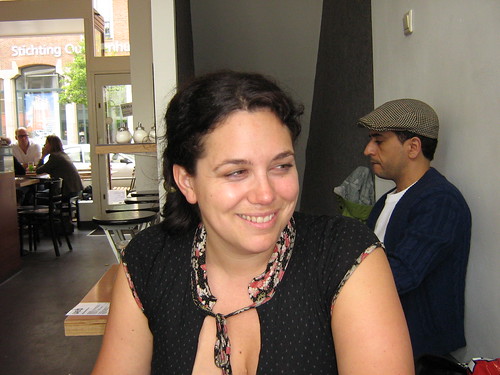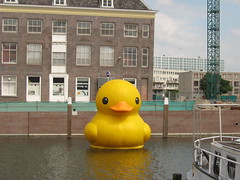Submission is the right word for it, that’s for sure! You must fill in these pdfs exactly the right way, with attachments in exactly the right order, without going over the unspecified-but-definitely-there character count in the text boxes, you must get lucky while uploading to grants.gov, and of course you must save everything every 2 minutes because Adobe will crash over and over and lose the unsaved form contents.
But in the end I got it in…would you believe the total time estimate for preparing the application was 15 hours? Who are they kidding.
Institutionalization of New Media: Analysis of the Dutch Context
Research and Contribution
With the introduction of the Internet and WWW in the 1990s, scholars, artists and activists began a critical engagement with technology. These early adopters were a loose collection of individuals that came out of more traditional fields including philosophy, literature, film studies, sociology, computer science. Some also came from outside of the academy; journalists, politicians, artists, activists and business people and have participated in the evolving discourse community as well. This diverse group was united by their shared observation of and concern with the effects of technology on their respective fields and their work has shaped the field we now know as new media. Now what began as a very open area of study is becoming institutionalized; a canon of critical theory is being established, and gate-keeping mechanisms are beginning to appear, along with the other apparatus typical of an academic discipline such as journals, conferences, degree programs and so on. Increasingly, questions are being raised about this institutionalization process and how it will affect our understanding of new media and its impact on our culture (Lovink, Rossiter, Zielinski).
While early scholarship on new media came from the aforementioned traditional disciplines, recently institutionalization has been driven by former members of the early adopter networks entering academia. This is to say that rather than only following a traditional scholarly route through the academy before becoming professors themselves, many people who first work and create with new media are now entering the academy, with or without formal credentials, and are shaping the discourse about the cultural effects of new media. What began as almost a folk practice now has been recognized by the academy. The line between creator and scholar/critic has been in some ways blurred and in others sharpened, but the process of these changes remains unexamined.
Through this project I expect to answer the following questions: 1) What is the relation between institutionalization and the people, physical things, and symbols in the networks that gave rise to new media? 2) How are institutions constructed that critically reflect on emerging technologies? 3) How are the social networks of participants reflected in and shaping institutional networks? 4) How is the fluid knowledge shared between participants becoming crystallized, being canonized, such that some groups are included or excluded? 5) And finally, what do we gain and lose in knowledge production through this process? I propose exploring the human archive embodied in the actor-network of individuals and groups currently working on new media.
The Netherlands is the best starting point as it is where some of the first university programs in new media began, and thanks to early and extensive government funding, a wide array of other cultural institutions have developed simultaneously. The Dutch context was originally characterized by heterogonous networks of people, things and symbols that were ad hoc and informal, but now all of these disparate elements contribute to the establishment of formal knowledge, specialization, and the construction of a canon. These activities are a clear sign of institutionalization, which also inevitably involves the development of gate-keeping processes. However, while institutionalization is taking place, the Dutch cooperative polder model still shapes socio-economic relations and allows for the continued emergence of new voices and new groups. Thus the whole spectrum of development is available for study.
Preliminary insight into the institutionalization of new media have been studied in isolation by pioneers such as Geert Lovink (Dark Fiber, Zero Comments), but no comprehensive studies have yet appeared. I intend a rhetorical analysis of the cultural discourse on new media in Europe which I will approach as a dispositif. While Foucault applied this concept to historical archives, I will engage with current participants through interviews and observations.
Methods and Work Plan
I am requesting support to complete the necessary observations and interviews which I aim to carry out during 2009-2010, making visits each year during the summer and winter. During a sabbatical I expect to begin in 2011, I will complete the compilation, authoring a book and website.
Methods and Work Plan
For this study I have already begun observing a variety of groups and interviewing their staff, including:
De Waag Society for Old and New Media
V2_Institute for the Unstable Media
Worm Rotterdam
De Geuzen Foundation for Multi-visual Research
The Netherlands Media Art Institute, Montevideo/Time Based Arts
Further visits to these institutions have been arranged for the award period, along with observations I have arranged at other cultural institutions and at numerous Dutch MA and PhD programs in New Media. Based on a survey of which programs have been actively publishing, seeking PhD candidates, participating in and holding conferences, I have established a list of schools hosting well-regarded programs studying and educating about new media, including:
Delft University of Technology Eindhoven University of Technology
Leiden University Piet Zwart Institute Radboud University Nijmegen
University of Amsterdam University of Maastricht
University of Twente University of Utrecht
This project will combine analysis of institutional documents with interviews and observations. At cultural institutions I will interview curators, project managers, directors and when possible artists/authors. At academic institutions I will interview faculty, administrators, and students. In particular, I will examine the basic degree structures, course content, reading lists, and assignments. When possible, sample student work will be studied as well. These interviews and observations will reveal informants’ history in the field and the interconnections between various factors such as experience, age, gender, ethnicity, location, education and so forth. At both cultural and academic institutions, I will observe events organized around new media which often reveal places where institutional and social networks are parallel and where they are unaligned.
That is all–at least all the plugged in activities. Except finishing a Sequential Tart interview with Paweł and the teaching assignments for next Fall and Spring. And just about finishing an article. I have one more to write by the end of June!

